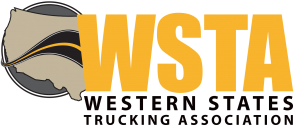Caltrans Trucking Incident Summary Report (2024-2025)
Click the folder icon at the bottom to download the report PDF.
Click the folder icon at the bottom to download the report PDF.
Despite all the heated rhetoric and lawsuit filed by California over U.S. DOT cutting $40 million in Motor Carrier Safety Assistance Program (MCSAP) funding from the state for not enforcing minimal English standards for commercial drivers at roadside, the California Highway Patrol (CHP) has begun to actually enforce the decades old regulation (§ 391.11 (b)(2) General qualifications of drivers).
391.11 (b)(2) simply states, “Can read and speak the English language sufficiently to converse with the general public, to understand highway traffic signs and signals in the English language, to respond to official inquiries, and to make entries on reports and records.”
WSTA has confirmed with the CHP that “effective December 23, 2025, the CHP amended its Commercial Vehicle Safety Alliance North American Standard Out-of-Service Criteria regulations to incorporate the revisions adopted by the CVSA on June 25, 2025 (that responded to the April 2025 Trump Executive Order directing the FMCSA to strengthen the English Language Proficiency requirements for commercial motor vehicle operators). This change is incorporated into Title 13, CCR, Division 2, Chapter 6.5, Amended Article 7.5, Section 1239 (read it here).
Background
CHP had never really enforced the English requirement at roadside. It was only sporadically noted on inspections reports and only cited the federal code, not a state code for the violation. There was no action taken against the driver if found in violation. U.S. DOT actually noted that in 30,000+ commercial inspections, only one violation was noted. Meanwhile states aggressively enforcing the rule have hundreds or thousands of violations and following the requirements take the driver out-of-service.
This all came to a head in August of 2025 after a California licensed truck driver, Harjinder Singh made an illegal U-turn on the Florida Turnpike resulting in three deaths. Officials in Florida claimed Singh didn’t understand English and should not have been licensed. U.S. DOT then sent California a notice that it had not adopted compatible laws with federal regulations as is required to receive MCSAP funding.
The Newsom Administration instead of attempting to calm the waters decided to go down a path of obstructionism – even though the state was in the wrong…likely for political reasons.
In October, after attempting to get California to adopt and enforce the regulation – like most states, and California’s (read Newsom Administration) continued foot dragging and obstructionism, the feds issued a Notice of Final Determination of Nonconformity as part of a process to revoke $40 million in safety grants. At the same time, the feds announced they would withhold over $40 million in grant funding.
In December, California decided to sue U.S. DOT in the U.S. District Court for the Northern District of California over the withholding of the $40 million. WSTA’s experience with that court is that it’s adverse to controversial lawsuits (we sued CARB in that court and filed the first legal challenge to the A-B-C test there too).
In California’s lawsuit challenging the withholding they had the “chutzpah” to legally argue the state already complied with the regulation during the driver’s licensing phase through DMV. That legal rationale was likely not going to go very far, even in the very liberal Ninth Circuit.
It is not even close to compatible to compare evaluations by poorly trained DMV personnel during the licensing phase to excellently trained and highly specialized commercial law enforcement officers at roadside interacting with truck drivers or at CHP truck scales. Additionally, California’s argument ignores the upwards of one million commercial drivers entering the state each year from other states (where there has been similar licensing issues) and foreign jurisdictions.
California is not the only state on US DOT’s radar for not properly enforcing federal regulations, for which billions are transferred from federal coffers to states to enforce the federal requirements. It is fair to say that California made itself a prime target because of Governor Newsom’s incessant desire to thwart any and everything coming from the Trump Administration, no matter if the feds were correct. Bringing the hammer down on California is clearly intended to get other non-conforming states to get their houses in order.
With CHP’s adoption, we expect to see more violations noted on inspection reports as well as those same drivers placed out-of-service. Supposedly, for California based drivers adversely affected, there will be (eventually) a notification pipeline to CA DMV to facilitate a driver seeking “re-assessment,” but that process is not up and running yet.
In order to keep membership fees, trucking supply costs, and enrollment fees as low as possible, WSTA and AADT is now charging a 3% processing fee on all credit card transactions as of December 1st, 2025. We encourage our members and clients to use alternative payment methods to avoid additional costs.
We also accept checks from WSTA members and money orders, as well as cash for in-person transactions.
Please contact us at cs@westrk.org with any questions.
Thank you,
Your WSTA and AADT Staff
In the October 14th, 2025 WSTA newsletter we linked to an article that stated Gov. Newsom signed into law a bill sponsored by labor that would require the Ports of LA and LB to collect specific information from trucking companies and independent contractors about their businesses. In fact, on the day that article was published, Gov. Newsom did the opposite and vetoed the bill (see below). Here is the source used corrected article: California governor vetoes truck drivers bill
SACRAMENTO – Governor Gavin Newsom today announced that California Air Resources Board (CARB) Chair Liane Randolph will be retiring from state service effective September 30, 2025 and named Senior Advisor to the Governor for Climate Lauren Sanchez to serve as the next CARB Chair.
“Serving the public has been the honor of a lifetime and I am incredibly proud of everything the agency has accomplished over the last five years. I thank Governor Newsom for the opportunity, my fellow board members for their partnership, and CARB staff for their unwavering dedication to the mission of clean air and a better future for all Californians,” said Chair Randolph. “As I leave state service, I do so with gratitude and hope — knowing the next generation is ready to lead with courage, compassion and conviction. Lauren brings intellect, tenacity and a deep commitment to California. I pass the baton with full confidence in her ability to carry this work forward with heart and vision.”

During her time as Chair, CARB expanded its focus on improving conditions in communities that suffer from the highest levels of air pollution in the state, and the Board has adopted landmark climate and environmental policies, including the 2022 Scoping Plan laying out California’s path to carbon neutrality by 2045, and implementing Governor Newsom’s 2020 executive order on zero-emission vehicles, accelerating the transition to a cleaner transportation system.
Other agency accomplishments during Chair Randolph’s term include:
Chair Randolph dedicated the majority of her career to public service, including more than 20 years in state leadership roles, most recently as CARB Chair since 2021. Prior to her work at CARB, Randolph served as a Commissioner at the California Public Utilities Commission from 2015 to 2021, Deputy Secretary and General Counsel at the California Natural Resources Agency from 2011 to 2014 and Chair of the California Fair Political Practices Commission from 2003 to 2007.
Chair Sanchez starts October 1, 2025, and assumes Chair Randolph’s current term which ends in December 2026. The appointment is subject to Senate confirmation
The WSTA signed onto an industry letter urging CARB to modify its Corporate Greenhouse Gas Reporting and Climate Related Risk Disclosure regulations. While the regulation doesn’t directly affect small entities, indirectly it will as effected entities will require those, they do business with to supply them with the necessary data to complete their reporting requirements.
Here you can read the full complaint and exhibits A and B from the lawsuit brought by four top truck makers against the CARB and Gavin Newsom.
WSTA has recently partnered with Regulis to help members save 10+ hours per week and thousands per year by automating compliance and safety and all the related tasks – things like DQ files, state / federal filings, and maintenance schedules.
WSTA assists members directly with many regulatory requirements of being a motor carrier such as updating your DOT number, small-fleet CARB CTC registration and even the federal New Entrant Safety audits (and we don’t charge members a fee).
The one thing we do not assist with is what is often termed managing the “back office.” This includes all sorts of primarily paperwork tasks such as maintaining up-to-date driver qualifications files, maintenance records, and compliance with hours-of-service records. Much of the required paperwork retention is part of having proper safety management in-place.
Lately, we have seen an uptick in members failing their safety audits, oftentimes because they have not properly maintained the required records mandated by regulation. We have always provided members with many of the required template forms they must maintain. The failures we are seeing are happening primarily with small motor carriers, especially owner-operators. It may seem weird that a one-truck operator must keep an employment application on file for themselves, but it is required.
Backoffice tasks can be tedious because of the paperwork. Worse, is forgetting when you need to renew or update something. For instance, we often aid members whose motor carrier permit expired, mostly because the expiration date went unnoticed. A “teaser” system that could let you know things like expiration dates and even save log-in information for various websites you often go to (FMCSA, Clearinghouse, DIR, CARB, etc.) could assist you in avoiding the frustration that comes with missing those dates.
Our new partnership is with regulis.ai. There are numerous articles in the trucking media about larger entities using AI to improve their motor carrier operations. For many smaller motor carriers, it can be difficult to see a “value proposition” in that technology. Regulis uses AI as part of its platform and allows the user to ask any sorts of compliance questions to get the answer. For instance, what is CARB’s Clean Truck Check (CTC)?
A cool feature of the platform is the ability to take a picture of a driver’s license to upload for DQ files and their system will automatically populate the driver centric information on the required forms, no need for manual entry of data!
The platform is available in multiple languages.
All members taking advantage of this partnership will get a 20% discount on the cost of subscribing.
